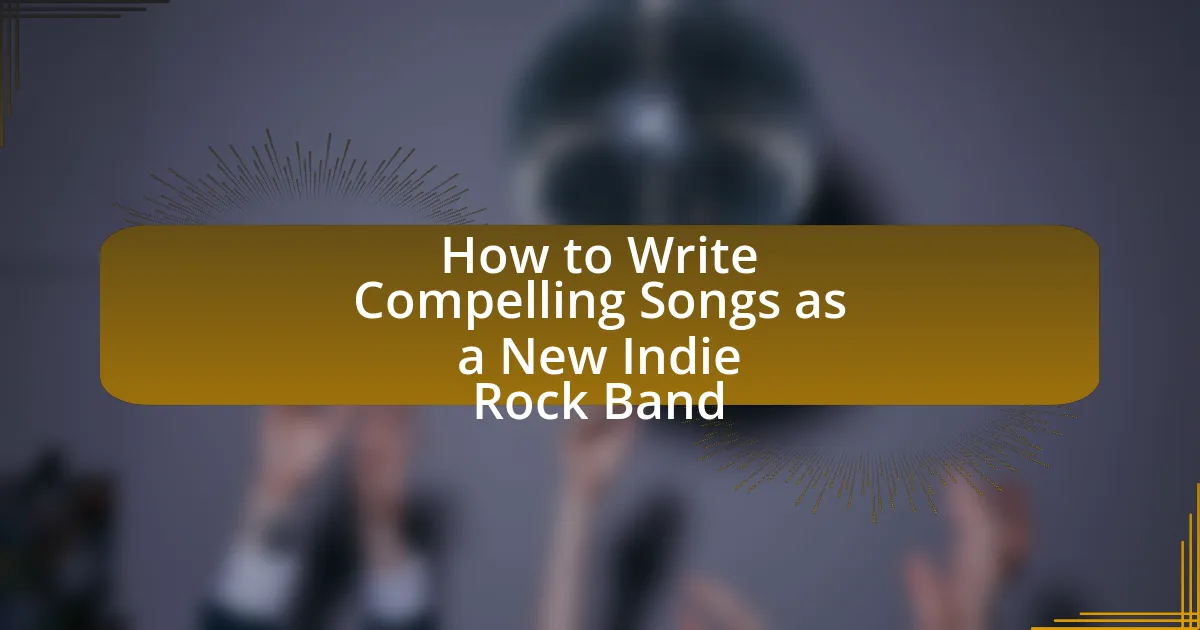The article focuses on the essential elements of writing compelling songs for new indie rock bands, emphasizing strong melodies, relatable lyrics, and unique instrumentation. It explores how lyrics contribute to a song’s impact, the themes that resonate with indie rock audiences, and the importance of melody and chord progressions in shaping emotional responses. Additionally, it discusses strategies for developing a unique sound, refining the songwriting process, and the benefits of collaboration and feedback among band members. The article also highlights resources available for aspiring songwriters, including workshops and online courses, to enhance their skills and creativity.

What are the key elements of writing compelling songs for a new indie rock band?
The key elements of writing compelling songs for a new indie rock band include strong melodies, relatable lyrics, and unique instrumentation. Strong melodies capture listeners’ attention and create memorable hooks, which are essential for audience engagement. Relatable lyrics resonate with listeners’ experiences and emotions, making the songs more impactful. Unique instrumentation, often characterized by unconventional sounds or arrangements, helps the band stand out in a crowded music scene. These elements combined contribute to the overall appeal and effectiveness of the songs, enhancing the band’s identity and connection with its audience.
How do lyrics contribute to the overall impact of a song?
Lyrics significantly contribute to the overall impact of a song by conveying emotions, storytelling, and thematic depth. They serve as the primary medium through which artists express their thoughts and feelings, allowing listeners to connect on a personal level. For instance, songs like Bob Dylan’s “The Times They Are a-Changin’” resonate due to their poignant lyrics that reflect social change, illustrating how powerful words can evoke strong emotional responses and inspire action. Additionally, research indicates that lyrics can enhance memorability; a study published in the Journal of Experimental Psychology found that songs with relatable and vivid lyrics are more likely to be remembered by listeners. This connection between lyrics and listener engagement underscores their crucial role in shaping a song’s overall impact.
What themes resonate most with indie rock audiences?
Indie rock audiences resonate most with themes of introspection, personal struggle, and social commentary. These themes reflect the emotional depth and authenticity that characterize the genre. For instance, many indie rock songs explore feelings of alienation and identity, often drawing from personal experiences or societal issues. This connection is supported by the popularity of artists like Bon Iver and Phoebe Bridgers, whose lyrics frequently delve into vulnerability and existential questions, appealing to listeners seeking relatable narratives. Additionally, the genre often addresses themes of love and heartbreak, which are universally relatable and evoke strong emotional responses, further solidifying their impact on the audience.
How can personal experiences enhance lyrical authenticity?
Personal experiences enhance lyrical authenticity by providing genuine emotions and relatable narratives that resonate with listeners. When songwriters draw from their own life events, they create lyrics that reflect true feelings, struggles, and triumphs, making the music more impactful. Research indicates that songs based on personal experiences often connect more deeply with audiences, as listeners can identify with the themes and emotions expressed. For instance, a study published in the Journal of Popular Music Studies found that autobiographical lyrics tend to evoke stronger emotional responses, reinforcing the idea that authenticity in songwriting stems from personal truth.
What role does melody play in songwriting?
Melody serves as a fundamental component in songwriting, acting as the primary vehicle for conveying emotion and capturing the listener’s attention. In the context of songwriting, a well-crafted melody can enhance the lyrical content, making it more memorable and engaging. Research indicates that melodies with a clear structure and emotional resonance are more likely to connect with audiences, as demonstrated by studies showing that songs with strong melodic hooks tend to achieve higher chart success. Thus, melody not only shapes the identity of a song but also plays a crucial role in its commercial viability and emotional impact.
How can chord progressions influence the mood of a song?
Chord progressions significantly influence the mood of a song by establishing emotional context through their harmonic structure. For instance, major chords typically evoke feelings of happiness and brightness, while minor chords often convey sadness or introspection. The use of specific progressions, such as the I-IV-V (C-F-G in C major), can create a sense of resolution and uplift, whereas progressions like the vi-IV-I-V (A minor-F-C-G) can elicit a more reflective or melancholic atmosphere. Research in music psychology indicates that listeners can subconsciously associate certain chord sequences with specific emotions, reinforcing the idea that the choice of chords directly impacts the listener’s emotional response.
What techniques can be used to create memorable hooks?
Memorable hooks can be created using techniques such as repetition, contrast, and emotional resonance. Repetition reinforces a catchy phrase or melody, making it easier for listeners to remember. Contrast, such as varying dynamics or tempo, captures attention and creates a memorable moment. Emotional resonance connects with listeners on a personal level, making the hook relatable and impactful. These techniques are supported by studies in music psychology, which show that hooks utilizing these elements are more likely to be retained by audiences.
Why is song structure important in indie rock?
Song structure is important in indie rock because it provides a framework that guides the listener’s emotional journey and enhances the overall impact of the music. A well-defined structure, such as verse-chorus-verse, allows for the development of themes and ideas, making the song more memorable and engaging. Research indicates that songs with clear structures are more likely to resonate with audiences, as they create familiarity and anticipation, which are crucial for listener retention. For instance, a study by the University of Southern California found that songs with predictable structures tend to achieve higher popularity on streaming platforms, demonstrating the effectiveness of structured songwriting in capturing listener interest.
What are common song structures used in indie rock?
Common song structures used in indie rock include verse-chorus, AABA, and ABAB formats. The verse-chorus structure typically alternates between verses that tell a story and a catchy chorus that encapsulates the main theme, which is prevalent in many successful indie rock songs. The AABA structure features two contrasting verses followed by a bridge and a return to the initial verse, allowing for emotional depth and variation. The ABAB format alternates between verses and choruses, creating a dynamic flow that keeps listeners engaged. These structures are widely adopted in the genre, as they provide a balance of familiarity and creativity, appealing to both artists and audiences.
How can variations in structure keep listeners engaged?
Variations in structure can keep listeners engaged by introducing unexpected elements that maintain interest and prevent predictability. For instance, altering the arrangement of verses, choruses, and bridges can create dynamic shifts that captivate the audience’s attention. Research indicates that songs with varied structures, such as those incorporating unconventional time signatures or unexpected key changes, are more likely to be memorable and enjoyable. A study published in the Journal of Experimental Psychology found that listeners prefer music that balances familiarity with novelty, suggesting that structural variations enhance emotional responses and overall engagement.

How can new indie rock bands develop their unique sound?
New indie rock bands can develop their unique sound by experimenting with diverse musical influences and incorporating personal experiences into their songwriting. This approach allows bands to blend various genres, such as punk, folk, and electronic, creating a distinctive style that resonates with their identity. For instance, bands like Arctic Monkeys and Vampire Weekend have successfully fused different elements, resulting in innovative sounds that set them apart in the indie rock scene. By focusing on originality and authenticity, new bands can carve out a niche that reflects their artistic vision.
What influences should be considered when defining a band’s sound?
When defining a band’s sound, influences such as genre, instrumentation, lyrical themes, cultural background, and personal experiences should be considered. The genre sets the foundational style, while instrumentation determines the sonic texture; for example, a band may choose electric guitars for a rock sound or synths for an electronic vibe. Lyrical themes reflect the band’s message and emotional resonance, often shaped by cultural background and personal experiences, which provide authenticity and relatability. Historical context, such as the evolution of indie rock and its subgenres, also plays a crucial role in shaping a band’s unique sound, as it allows for the integration of various influences and trends that resonate with contemporary audiences.
How can genre blending enhance a band’s musical identity?
Genre blending can enhance a band’s musical identity by allowing for a unique sound that differentiates them from others in the industry. This fusion of styles can attract a broader audience, as it incorporates diverse influences that resonate with various listener preferences. For example, bands like The Beastie Boys successfully combined hip-hop with rock, creating a distinct identity that appealed to fans of both genres. Additionally, genre blending can foster creativity, encouraging musicians to experiment with different instruments, rhythms, and lyrical themes, ultimately leading to innovative compositions that reflect their artistic vision.
What role do instrumentation and arrangement play in sound development?
Instrumentation and arrangement are crucial in sound development as they define the texture and character of a musical piece. Instrumentation involves selecting specific instruments that contribute unique timbres and tonal qualities, while arrangement refers to how these instruments are organized and interact within a composition. For example, a song featuring electric guitars, bass, and drums creates a different sonic landscape compared to one that incorporates strings or synthesizers. The arrangement dictates dynamics, rhythm, and harmony, influencing the overall emotional impact of the music. Studies show that effective instrumentation and arrangement can enhance listener engagement and retention, making them essential elements for indie rock bands aiming to create compelling songs.
How can collaboration within the band improve songwriting?
Collaboration within the band can significantly improve songwriting by combining diverse musical ideas and perspectives. When band members work together, they can share their unique influences, leading to a richer and more varied sound. For instance, a study published in the Journal of Creative Behavior found that collaborative songwriting often results in more innovative compositions compared to solo efforts, as it encourages brainstorming and the blending of different styles. This synergy can enhance creativity, allowing for the exploration of new themes and structures that may not emerge in individual songwriting.
What are effective ways to share ideas and feedback among band members?
Effective ways to share ideas and feedback among band members include regular meetings, collaborative songwriting sessions, and utilizing digital communication tools. Regular meetings allow band members to discuss their thoughts and suggestions in a structured environment, fostering open dialogue. Collaborative songwriting sessions encourage creativity and collective input, leading to a more cohesive sound. Digital communication tools, such as group chats or project management apps, facilitate ongoing discussions and idea sharing, ensuring that all members can contribute regardless of their schedules. These methods enhance collaboration and improve the overall songwriting process, as evidenced by successful bands that prioritize communication and teamwork.
How can guest musicians contribute to a band’s sound?
Guest musicians can enhance a band’s sound by introducing new instrumental textures, vocal styles, and creative ideas. Their unique skills and perspectives can lead to innovative arrangements and fresh sonic elements that diversify the band’s overall sound. For example, a guest violinist can add a classical layer to a rock track, while a guest vocalist might bring a different emotional depth or genre influence, enriching the band’s musical palette. This collaborative approach has been utilized by numerous successful bands, such as Fleetwood Mac and The Beatles, who often featured guest artists to expand their sound and appeal.

What strategies can new indie rock bands use to refine their songwriting process?
New indie rock bands can refine their songwriting process by implementing collaborative writing sessions, which encourage diverse ideas and perspectives. Collaborative sessions allow band members to contribute unique influences and styles, enhancing creativity and innovation in songwriting. Additionally, establishing a routine for regular songwriting practice can help bands develop their skills and maintain momentum. Research indicates that consistent practice leads to improved songwriting abilities, as seen in successful bands that dedicate time to writing regularly. Lastly, seeking feedback from peers and mentors can provide valuable insights, helping bands identify strengths and areas for improvement in their songs.
How can regular practice improve songwriting skills?
Regular practice enhances songwriting skills by fostering creativity, improving technical abilities, and developing a unique voice. Engaging in consistent songwriting exercises allows musicians to experiment with different styles, structures, and lyrical themes, which can lead to more innovative and compelling songs. Research indicates that musicians who practice regularly show significant improvement in their songwriting capabilities, as they become more adept at crafting melodies and harmonies, as well as refining their lyrical content. For instance, a study published in the Journal of Music Theory found that musicians who dedicated time to daily songwriting exercises reported increased confidence and creativity in their work.
What exercises can help stimulate creativity in songwriting?
Engaging in free writing exercises can significantly stimulate creativity in songwriting. This involves setting a timer for a specific duration, such as 10 minutes, and writing continuously without worrying about grammar, structure, or coherence. This method encourages the flow of ideas and can lead to unexpected lyrical themes or melodies. Research indicates that free writing can enhance creative thinking by reducing self-censorship and allowing subconscious thoughts to surface, which is essential for songwriters looking to explore new concepts and emotions.
How can setting deadlines enhance productivity in writing songs?
Setting deadlines enhances productivity in writing songs by creating a sense of urgency that motivates songwriters to focus and complete their work. When songwriters establish specific timeframes for finishing songs, they are more likely to prioritize their creative process, reducing procrastination and distractions. Research indicates that time constraints can lead to increased creativity and efficiency, as seen in studies where participants produced more innovative ideas under time pressure. Therefore, implementing deadlines can significantly improve the output and quality of songwriting efforts for new indie rock bands.
What resources are available for aspiring songwriters?
Aspiring songwriters can access a variety of resources to enhance their craft, including online courses, songwriting workshops, and songwriting software. Online platforms like Coursera and MasterClass offer courses taught by experienced songwriters, providing structured learning and insights into the songwriting process. Workshops, often hosted by music schools or local community centers, allow for hands-on experience and feedback from peers and instructors. Additionally, software such as Ableton Live and GarageBand can assist in composing and arranging music, making it easier for songwriters to experiment with their ideas. These resources collectively support the development of songwriting skills and creativity.
How can songwriting workshops and online courses benefit new bands?
Songwriting workshops and online courses can significantly benefit new bands by providing structured learning, expert feedback, and collaborative opportunities. These educational platforms often cover essential songwriting techniques, helping bands develop their unique sound and improve their lyrical and compositional skills. For instance, a study by the Berklee College of Music found that participation in songwriting workshops enhances creativity and collaboration among musicians, leading to higher-quality compositions. Additionally, online courses often include access to industry professionals who can offer valuable insights and mentorship, further aiding in the band’s artistic growth and marketability.
What role do songwriting books and guides play in skill development?
Songwriting books and guides play a crucial role in skill development by providing structured knowledge and techniques that aspiring songwriters can apply. These resources often cover essential elements such as melody, harmony, lyric writing, and song structure, which are fundamental for creating compelling music. For instance, books like “Writing Better Lyrics” by Pat Pattison offer specific exercises and insights that help songwriters enhance their lyrical skills, while “The Complete Singer-Songwriter” by Jeffrey Pepper Rodgers discusses the integration of storytelling in songwriting. Such guides not only teach theoretical concepts but also encourage practical application through exercises and examples, thereby facilitating the growth of songwriting abilities in a systematic manner.
What are some best practices for receiving and implementing feedback?
Best practices for receiving and implementing feedback include actively listening, asking clarifying questions, and maintaining an open mindset. Actively listening ensures that the feedback provider feels heard and valued, which can lead to more constructive insights. Asking clarifying questions helps to fully understand the feedback and its context, allowing for better implementation. Maintaining an open mindset fosters a willingness to adapt and improve, which is crucial for growth as a songwriter. Research indicates that musicians who engage in feedback loops, such as peer reviews, often produce higher quality work, as collaboration enhances creativity and refines skills.
